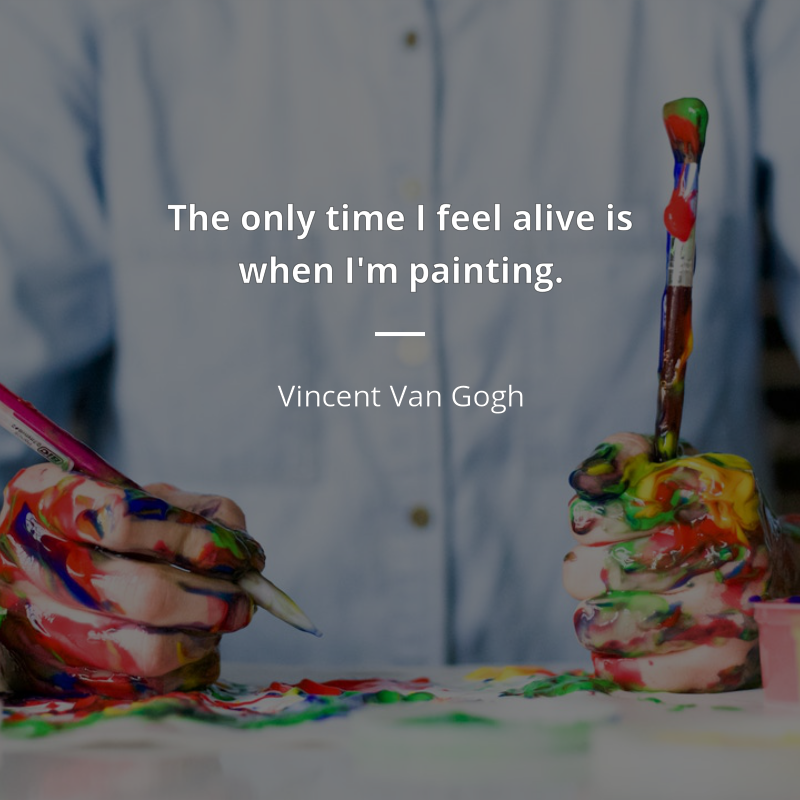Vincent Van Gogh Frases famosas
Citações de vida de Vincent Van Gogh
Citações de idade de Vincent Van Gogh
Vincent Van Gogh frases e citações
“Quanto mais se ama, mais ativo será.”
Je mehr man liebt, um so tätiger wird man sein.
carta para Anthon G.A. Ritter van Rappard, Mai 1883
Vincent Van Gogh: Frases em inglês
“The sadness will last forever.”
Attributed to Vincent, as quoted by Theo van gogh in his letter from Paris, to Elisabeth van Gogh, 5 August 1890 http://www.webexhibits.org/vangogh/letter/21/etc-Theo-Lies.htm
Some of the last words Vincent said to Theo, while dying
1890s

“To some, woman is heresy and diabolical. To me she is just the opposite.”
1880s, 1884, Letter to Theo (Nuenen, Oct. 1884)
Contexto: Oh, I am no friend of present-day Christianity, though its Founder was sublime - I have seen through present-day Christianity only too well. That icy coldness hypnotized even me, in my youth - but I have taken my revenge since then. How? By worshipping the love which they, the theologians, call sin, by respecting a whore [ Sien in The Hague ]), etc., and not too many would-be respectable, pious ladies. To some, woman is heresy and diabolical. To me she is just the opposite.
Quote in Vincent's letter, from Arles, Tuesday, 18 September 1888; as cited in Van Gogh : The Self-portraits (1969) by Fritz Erpel, p. 17
Variant translations: The more I think about it, the more I realize there is nothing more artistic than to love others.
As quoted in Mary Engelbreit's Words To Live By (1999) by Mary Engelbreit
I tell you the more I think, the more I feel that there is nothing more truly artistic than to love people.
1880s, 1888
Variante: There is nothing more truly artistic than to love people.
“I dream my painting, and then I paint my dream.”
As quoted in Marry Your Muse: Making a Lasting Commitment to Your Creativity (1997) by Jan Phillips, p. 176
Undated
“There is peace even in the storm”
Fonte: The Letters of Vincent van Gogh
Quote of Vincent's letter to Theo, from Amsterdam, 3 April 1878; a cited in The Letters of Vincent van Gogh to his Brother, 1872-1886 (1927) Constable & Co
Variant: Love many things, for therein lies the true strength, and whosoever loves much performs much, and can accomplish much, and what is done in love is done well.
As quoted in Wisdom for the Soul : Five Millennia of Prescriptions for Spiritual Healing (2006) by Larry Chang, p. 483
1870s
Contexto: If only we try to live sincerely, it will go well with us, even though we are certain to experience real sorrow, and great disappointments, and also will probably commit great faults and do wrong things, but it certainly is true, that it is better to be high-spirited, even though one makes more mistakes, than to be narrow-minded and all too prudent. It is good to love many things, for therein lies the true strength, and whosoever loves much performs much, and can accomplish much, and what is done in love, is well done.
“Love always brings difficulties, that is true, but the good side of it is that it gives energy.”
In his letter to Theo, from Nuenen, c. 9 March 1884, http://www.webexhibits.org/vangogh/letter/14/359.htm
1880s, 1884
Contexto: Love always brings difficulties, that is true, but the good side of it is that it gives energy.... I have not yet had enough experience with women. What we were taught about them in our youth is quite wrong, that is sure, it was quite contrary to nature, and one must try to learn from experience. It would be very pleasant if everybody were good, and the world were good, etc. - yes - but it seems to me that we see more and more that we are not good, no more than the world in general, of which we are an atom - and the world no more good than we are. One may try one's best, or act carelessly, the result is always different from what one really wanted. But whether the result be better or worse, fortunate or unfortunate, it is better to do something than to do nothing. If only one is wary of becoming a prim, self-righteous prig - as Uncle Vincent calls it - one may be even as good as one likes.
1880s, 1880, Letter to Theo (Cuesmes, July 1880)
Contexto: There is a great difference between one idler and another idler. There is someone who is an idler out of laziness and lack of character, owing to the baseness of his nature. If you like, you may take me for one of those. Then there is the other kind of idler, the idler despite himself, who is inwardly consumed by a great longing for action who does nothing because his hands are tied, because he is, so to speak, imprisoned somewhere, because he lacks what he needs to be productive, because disastrous circumstances have brought him forcibly to this end. Such a one does not always know what he can do, but he nevertheless instinctively feels, I am good for something! My existence is not without reason! I know that I could be a quite a different person! How can I be of use, how can I be of service? There is something inside me, but what can it be? He is quite another idler. If you like you may take me for one of those.
